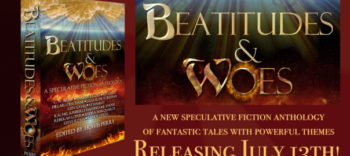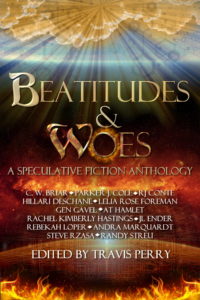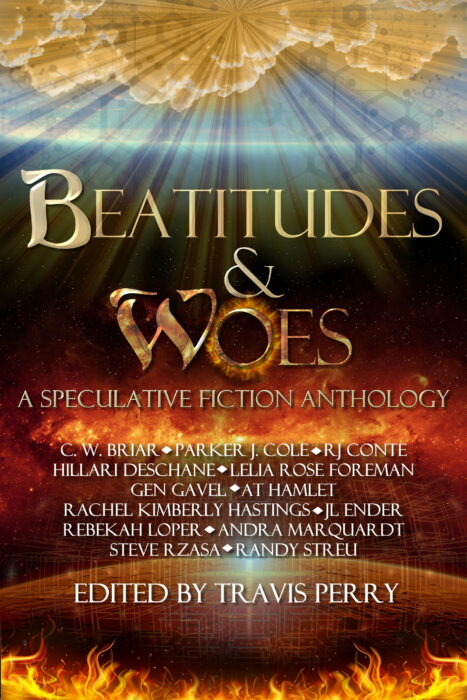Beatitudes and Woes: A Groundbreaking Anthology
Why would anyone identify himself or herself as a Christian writer of speculative fiction? Is it because Christian writers of science fiction, fantasy, and horror simply want to associate with other Christians who write these genres (sort of like a social club), without any expectation that their personal faith would change the stories they write? Or do speculative fiction writers who self-identify as “Christian” (like I do) mean they will write the same sorts of things that other speculative fiction writers produce, minus a “naughty list” of things they think should be excluded (such as graphic sex and/or violence, profanity, witchcraft, etc)? Or is there a positive meaning of being a “Christian writer of speculative fiction”–“positive” as in we intend to break new ground, to approach topics that the world around us isn’t interested in–or to approach them in a fresh way? This post suggests the soon-to-be-released Beatitudes and Woes anthology offers what I hope will become a model for the type of groundbreaking I’m talking about.
Beatitudes and Woes is built around an inherently simple but innovative idea. Imagine famous sayings that Jesus used, which unlike many of his principles don’t come already illustrated with a story (in a parable). Imagine making those sayings the foundation for a set of stories. An anthology of tales linked to well-known passages of Scripture–that seems truly groundbreaking to me, because if anyone has done that particular idea before, I haven’t heard of it. (Though of course many, many stories have been inspired by the Bible in various other ways.)
It’s a simple concept, but brilliant. Of the “why didn’t anyone think of doing this before?” kind of thing. Also, not my idea. CW Briar came up with this notion and posted it on the Realm Makers Consortium Facebook page. A lot of people were immediately excited, including me.
Before I knew it, I found myself having volunteered to collect all these writings from a diverse group of authors who volunteered to participate, edit their tales, and put it all together into this anthology. I had no way of knowing how much I was biting off when I committed to this project, nor how busy I would be with matters not related to the stories around the time submissions started rolling in. It’s 13 stories after all, since there are 9 beatitudes or “blessed are” statements Jesus made in Matthew 5 and four woes (as in “woe to those who”) in Luke 6. (You just can’t process 13 stories in only a few minutes…well, I can’t, anyway.)
I hoped to get finished much earlier than what has actually happened–that is, we’ll be doing a book release party on Saturday July 13th on Facebook (the date matching the number of authors), with announcements to be posted various places, including the Realm Makers Consortium page. But I’d originally shot for March.
I wound up over-promising on what I was able to do, embarrassing myself, but it also was true that two authors who had initially volunteered dropped out for reasons I don’t need to go into detail about here. I appreciate them having sent stories in the first place but it took some time to get replacement stories written and edited. Thanks so much to Randy Streu and Parker J. Cole stepping in to provide those replacements.
When I mentioned a “diverse group of authors” above, I wasn’t really talking about diversity of ethnicity or gender (though 8 of the authors are women and 1 is African American), but rather diversity of writing experience, writing style, and focus. Though I was as surprised by parallels among the stories as I was by unique features. Beatitudes and Woes has a comedic superhero story, two tales of outer space adventure (with a third being outer space horror), two examples of intense religious/ethnic persecution, two stories featuring island societies (and one featuring a desert people in their own kind of oasis-island), an extraterrestrial courtroom drama and a post-apocalyptic detective story, a Hunger Games-style tribal competition, and a quest to slay a dragon.
Only a few of the stories have straight-out happy endings that sometimes it seems Christian authors are addicted to. Even when the protagonist triumphs, it usually costs something, at the very least, anguish and grief. But a number of the stories end with the protagonist still a prisoner either literally or of circumstances–or with the worst thing the main character could imagine happening having taken place.
And there’s self-sacrifice, too, plenty of it. But there’s also the guilt-ridden act of selfishly sacrificing others. Not all of the most important characters make it out of their stories alive.
It’s really been a great experience putting these stories together. Some of these tales will rattle around my brain for years to come. Some of them really do make the Bible verses that inspired them take on new meaning for me.
Yes, I said “some”–yes it’s true some of the stories affected me more than others. I suspect the same thing will happen with you if you experience the blessing of reading this book. Though the ones that affect you the most may not be the same as the ones that I will always remember. I think this anthology has that kind of diverse mix–one that will have a positive impact on a wide variety of people, but in differing ways for different people.
Please note that I’d like to make special mention of Cindy Koepp, who volunteered to help me edit and get this book finished and is helping promote it. I’m also grateful for Mary Campagna Findley, who made a great cover, and the extra work Parker J Cole and Rachel Kimberly Hastings have done to promote this book in addition to being authors. (And as always, I grateful for the amazing support from Tabatha Catalan Guerrero de Perry, my wife.)
Of course, now that Beatitudes and Woes is about to be released, it may be that many books after it will link verses to an anthology of short stories as a way to make a uniquely Christian approach to writing speculative fiction. I hope so.
If so, Beatitudes and Woes will have paved the way for that kind of anthology. Preparing the way for others to follow. Groundbreaking.
Readers of this post, do you have any questions about the anthology? Any comments? I’d be happy to answer or respond.































Rachel Kimberly Hastings (one of the anthology authors) will also blog about Beatitudes and Woes tomorrow. Check it out at:
https://storytellertreehouse.tumblr.com/
I know you said this particular one wasn’t your idea, but I still find your anthology ideas fascinating. Also, your willingness to work with authors to put them together.
Jill, I started out publishing not really knowing what I was doing. I still am learning, but getting better and better (I think). But I find that I have an intuitive sense of what is good in a story and I do not deny what that sense tells me. It allows me to recognize great ideas, whether they are mine or not, and to edit in detail to bring a story along to its best version of itself.
Of course we could analyze my intuitive sense if we wanted to and attempt to assign some of it to upbringing and some to what I have read and some to my brain function or whatever, but it’s simpler–also more TRUE–to simply call what I have a gift of God.
I’d love to work with you again, by the way, Jill. You’re often off doing your own thing without time to join a group work (or so it seems to me) but you are among the most talented writers I’ve ever accepted a story from.
If you have any loose stories floating around you haven’t already put in a collection of your own, please let me know. I’m interested!
Thanks, Travis. I’ve been working on my Roswell alien novel in fits and starts, but I could take a break to write short stories. Yes, I’m always off doing my own thing. I don’t always like that about myself. But, for example, I’ve continued to read this blog passively since leaving social media and recently added it to my WordPress feed to stay more connected.
Sounds interesting 🙂 I’m not usually into short stories(both in terms of writing and reading them) but I’ve been getting better about that lately, so I’ll probably try this anthology out eventually.
Autumn, the longest story in the anthology, titled the “The Path of Mercy,” by Rebekah Loper, has the feel of an immersive fantasy, even though it’s only about 15 thousand words. And its ending is, well–it surprised me.
In my opinion, that one story alone is worth you getting the Kindle edition of this book, even if you aren’t into short stories. (It’s available for pre-order on Amazon by the way:
https://www.amazon.com/Beatitudes-Woes-Speculative-Fiction-Anthology-ebook/dp/B07TVYXN49/)
Fifteen thousand words is actually longer than I was expecting these stories to be (even though that is still short). There have been several short stories I’ve liked, such as some I had to read for English classes. But, I dunno. I guess when I discover a story I love, I often find myself wanting more and more of it, so longer stories tend to work better for me from that standpoint. And then, regardless, my favorite long stories tend to take more precedence in my memory for some reason.
That said, I am still interested in this new anthology, so I probably will try it some day. I’ll stick the link in my bookmarks and wishlist for later(I just got through buying a couple books yesterday, so…).
Actually, I began doing something like this with the Psalm Series that I started with Mesu Andrews and Carole Towriss. https://psalmseries.com/
The idea was to take the poetic sections of Scripture and write stories inspired by them or based on them. One is a fantasy parable based on Psalm 23. Another is a historical novel set in the New Testament time period, where the apostles use the psalm it’s based on as a centerpiece in their struggle. The last is a historical novel about Israel’s captivity in Babylon, based on one of the psalms that was written from the perspective of someone who endured captivity in Babylon. I’ve had to put a pause on the series because it’s been too much to keep two series going concurrently, along with the additional writing jobs I have. But it’s been fun so far. Sounds like a cool series, Travis! Also very cool to see Parker’s contributing. Pumped for it! Blessings on it.
Oh! Very cool. Never heard of the Psalm Series before.
Yes, you’re right, it’s basically the same idea, though with longer books and longer passages of Scripture.
SO NOT AS GROUNDBREAKING AS I THOUGHT–but that’s OK. We can “break ground” together. 🙂
I thought the same thing with the Psalm Series, but here you all are. Two very similar, independent ideas around the same time. That counts! 🙂
It’s almost as if God had something to do with what we “just happened to be thinking” 🙂